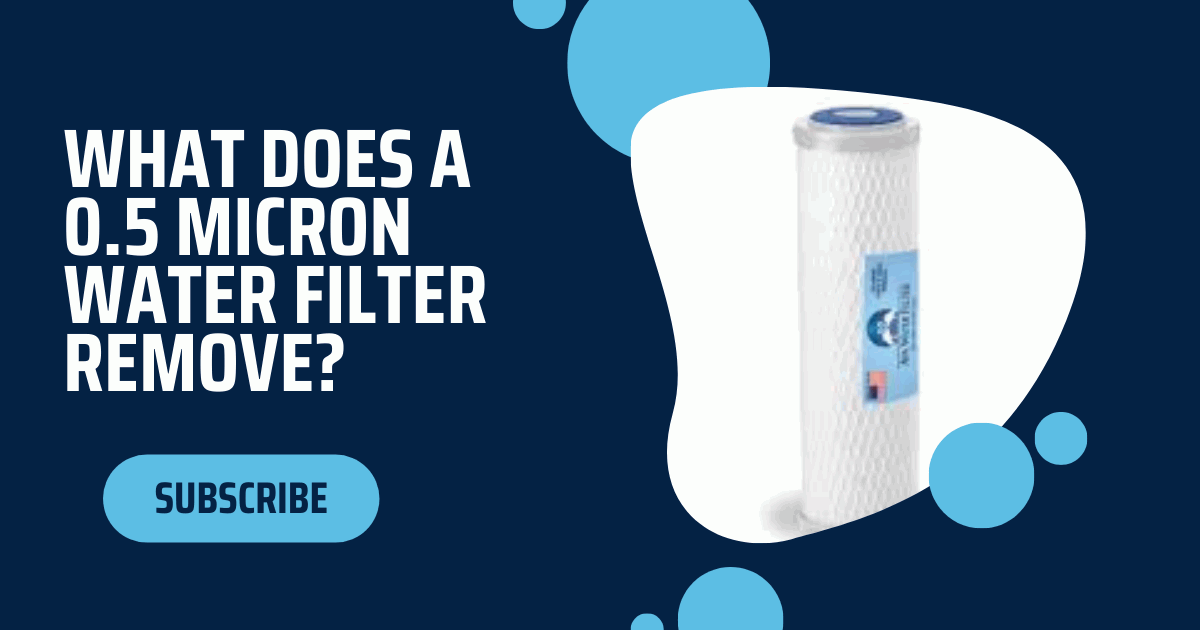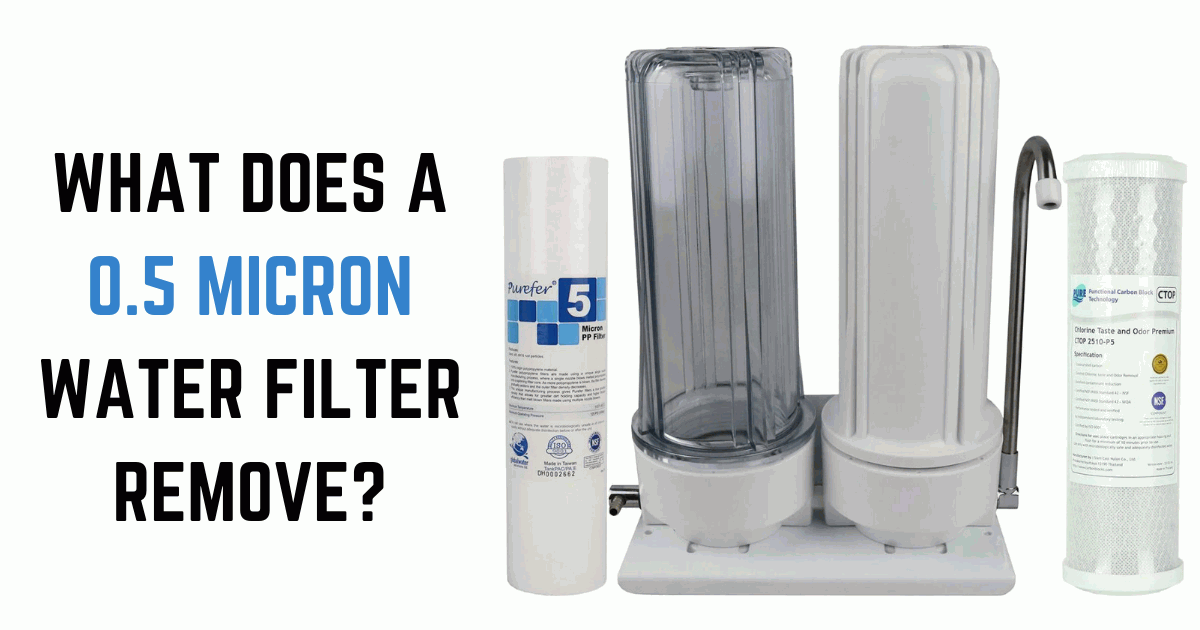What Does a 0.5 Micron Water Filter Remove? In today’s world, where health and clean living are paramount, ensuring the quality of your drinking water is essential. Municipal tap water undergoes rigorous treatment processes,
But contaminants can sometimes enter the system through aging pipes or local environmental factors. Here’s where water filters come in, acting as your home’s personal defense against unwanted impurities.
Understanding Micron Ratings in Water Filters
Micron is a unit of measurement used to represent microscopic lengths. One micron is equal to one-thousandth of a millimeter. When it comes to water filters, the micron rating signifies the smallest size of particles the filter can trap. Imagine a sieve – the smaller the holes in the sieve, the finer the particles it can capture.

The Power of 0.5 Micron Water Filters
A 0.5 micron water filter is a highly effective filtration system that removes a wide range of contaminants, including:
- Sediment: Sand, silt, rust, and other debris often found in water supplies. These can affect the taste and aesthetics of your water, and can also clog pipes and appliances over time.
- Micron-sized parasites: Giardia and Cryptosporidium are microscopic organisms that can cause gastrointestinal illnesses. By filtering these out, 0.5 micron filters ensure a safer drinking experience.
- Bacteria: Most harmful bacteria, including E. coli and coliform bacteria, are larger than 0.5 microns and can be effectively removed by these filters. This significantly reduces the risk of waterborne diseases.
- Some viruses: While not all viruses are large enough to be captured by 0.5 micron filters, some larger viruses can be eliminated, providing an extra layer of protection.
- Chlorine taste and odor: Chlorine is a disinfectant commonly used in municipal water treatment. While it effectively eliminates harmful bacteria, it can leave an unpleasant taste and odor in drinking water. 0.5 micron filters often incorporate carbon filtration technology that absorbs chlorine, significantly improving the overall taste and quality of your tap water.
Additional Benefits of 0.5 Micron Filtration
Beyond removing contaminants, 0.5 micron filters offer several advantages:
- Enhanced Clarity: Enjoy crystal-clear, sparkling water for drinking and cooking. Not only is clear water more aesthetically pleasing, but it can also be a sign that impurities have been effectively removed.
- Protection for Appliances: By filtering out sediment and other particles, you safeguard your ice maker, coffee maker, and other water-using appliances from damage that can be caused by these contaminants. This can extend the lifespan of your appliances and save you money on replacements.
- Peace of Mind: Knowing your water is clean and free of harmful impurities provides peace of mind for you and your family. You can feel confident using your tap water for drinking, cooking, and making beverages without worrying about potential health risks.
Beyond 0.5 Micron: Exploring Other Filtration Options
While 0.5 micron filters are a powerful solution, it’s essential to consider your specific water quality concerns. Here’s a brief overview of other filtration options, each with its own unique benefits:
- 10 Micron Sediment Filters: As the name suggests, these filters are designed to remove larger particles like sand, silt, and rust. They are ideal for pre-filtration, protecting finer filters from clogging by larger contaminants.
- Carbon Block Filters: These filters are particularly effective at eliminating chlorine taste and odor, as well as volatile organic compounds (VOCs) that can sometimes be present in water. They are often used in conjunction with other filtration methods for comprehensive contaminant removal.
- House Carbon Filters: Installed at the main water line, these filters provide whole-house filtration for comprehensive contaminant removal throughout your home. This is a good option if you want all the water coming into your house to be filtered, not just the water you drink.
Choosing the Right Water Filter for Your Needs
The best water filter for your home depends on your local water quality and your specific filtration requirements. Here are some factors to consider:
- Contaminants in Your Water Supply: The first step is to identify the potential contaminants in your water. You can obtain a water quality report from your local water authority or get your water tested by a qualified laboratory. Knowing what you’re up against will help you choose the most suitable filter.
- Desired Level of Filtration: Consider the types of impurities you want to remove. If you’re primarily concerned about sediment and taste, a basic 0 micron filter might suffice. However, for comprehensive protection against bacteria, parasites, and some viruses, a 0.5 micron filter is a more robust option.
- Water Flow Rate: Different filters have varying flow rates, which can affect how quickly your filtered water is dispensed. If you prioritize fast water flow, you might need to choose a filter with a slightly higher micron rating to ensure optimal performance.
Maintaining Your Water Filter for Optimal Performance
To ensure your 0.5 micron water filter continues to function effectively, regular maintenance is crucial. Here are some key points to remember:
- Filter Replacement: Replace your filter cartridges according to the manufacturer’s instructions. This is typically every 3-6 months, depending on the filter type and your water usage. Using an expired filter can compromise its effectiveness and allow contaminants to pass through.
- Cleaning: Some filters require periodic cleaning to remove any accumulated sediment or debris. Consult the manufacturer’s instructions for proper cleaning procedures.
Conclusion: Invest in Clean, Healthy Water with a 0.5 Micron Filter
By opting for a 0.5 micron water filter, you’re making a significant investment in the health and well-being of yourself and your family. With its ability to remove a broad spectrum of contaminants, improve taste, and protect your appliances, a 0.5 micron filter provides a powerful and convenient solution for achieving cleaner, healthier drinking water at home.
Bonus Tip: Consider using a combination of filtration methods to address your specific water quality concerns. For example, a pre-filter to remove large particles followed by a 0.5 micron filter for comprehensive contaminant removal can be a highly effective solution.
Remember: Consulting a water treatment professional can be helpful, especially if you have concerns about your local water quality or have specific filtration needs. They can assess your water and recommend the most suitable filtration system for your situation.
